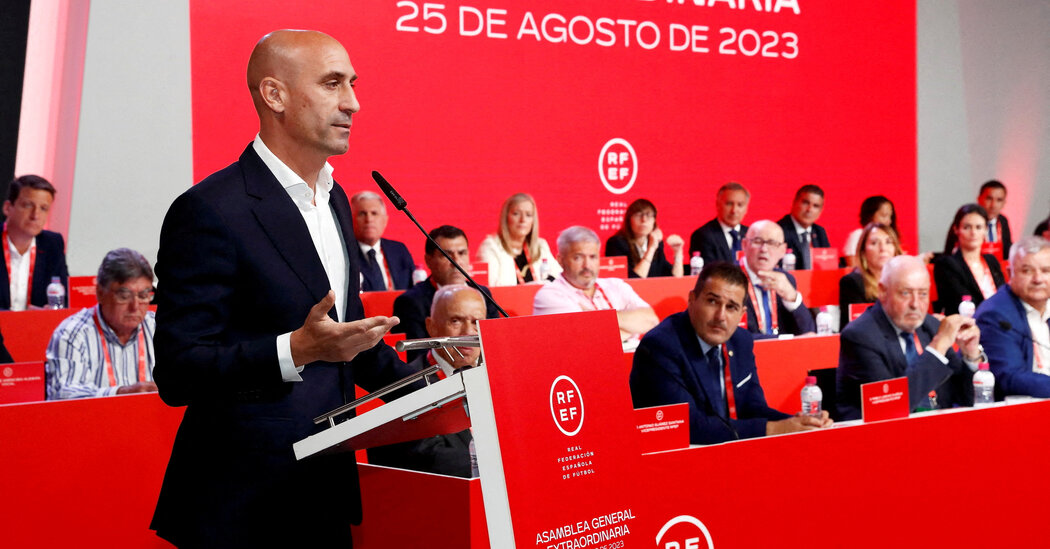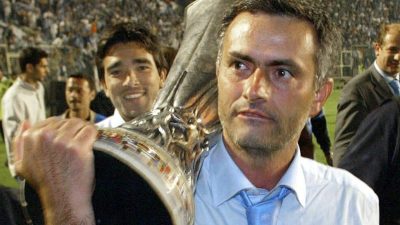Only hours after the head of the Spanish soccer federation insisted he would not step down for grabbing and kissing a member of Spain’s championship team at the Women’s World Cup medals ceremony last weekend in Australia, players on the squad announced on Friday that they would refuse to play until he was gone.
In a joint statement issued through their union, dozens of players said they would not take the field to play for Spain “if the current managers continue.”
In the statement, the player who was kissed, Jennifer Hermoso, said that “at no time did I consent to the kiss that he gave me.”
The players’ ultimatum came after Luis Rubiales, president of the Royal Spanish Football Federation, said Friday he would not step aside, arguing that he was the victim of “social assassination.”
News reports had predicted that Mr. Rubiales would quit after five years at the helm of Spanish soccer, but he instead took a defiant stand.
“I will not resign,” he said several times at an extraordinary meeting of the federation, to loud applause from some and silence from others, adding that “I will fight this to the end” and accusing his critics of “false feminism.”
In their response, the players condemned “behaviors that have violated the dignity of women,” saying they expected “forceful answers from the public powers” to address the episode.
The government is limited in its ability to punish members of the soccer federation, but after Mr. Rubiales made his remarks on Friday, it said it was taking steps to have him suspended. Víctor Francos, president of the National Sports Council and secretary of state for sports, said on Cadena SER radio, “We’re going to act — we’ve activated all the mechanisms to take appropriate measures.”
The controversy was a reminder that despite the Spanish team’s steep trajectory into the highest echelons of women’s soccer — the team did not even qualify for a Women’s World Cup until 2015 — the program has been dogged by sexism and other scandals.
Most recently, 15 players revolted last year against the coach, Jorge Vilda, and the federation led by Mr. Rubiales. They complained of outdated training methods and controlling behavior, and they refused to play for the national team, although some of them returned and participated in the World Cup.
The players’ use of the plural “current managers” in their statement on Friday seemed to imply that Mr. Vilda would also need to be removed before they would again play for Spain.
Members of the women’s national team have also reported being disrespected by top male soccer executives, saying that the men’s team was given superior equipment and treatment. Mr. Vilda has emerged as a polarizing figure in Spanish soccer, but Mr. Rubiales thanked him effusively on Friday and said he would be rewarded with a new contract.
Complaints of sexism have persisted for decades. Before the Spanish team’s ascent, it was led for 27 years by Ignacio Quereda, who called some players “chavalitas,” or immature girls, before finally being dismissed when the players protested.
After the World Cup final in Sydney on Sunday, Mr. Rubiales was captured on video kissing Ms. Hermoso, a Spanish forward, fully on the lips. In a post-match video, she was seen apparently making her distaste known, saying, “Hey, but I didn’t like that!”
Mr. Rubiales, who had offered a tepid apology on Monday as the outrage began to grow, offered a drastically different account on Friday. Ms. Hermoso, he said, lifted him off his feet and “moved me close to her body.”
In a statement released earlier this week by the soccer federation in Ms. Hermoso’s name, she was quoted as saying of the soccer chief’s actions, “It was a totally spontaneous mutual gesture because of the huge joy of winning a World Cup.”
But on Wednesday, Ms. Hermoso demanded through her union that “measures” be taken against Mr. Rubiales. And on Thursday, after receiving at least four complaints, the National Sports Council threatened to disqualify him from public office for violating the country’s law on sexual violence in sports if the federation did not fire him first.
In the statement from the players on Friday, Ms. Hermoso emphasized that no consent for the kiss had been given.
“I want to clarify that, as seen in the images, at no time did I consent to the kiss he gave me,” Ms. Hermoso wrote. “I do not tolerate my word being questioned, much less that it be made-up words that I haven’t said.”
Mr. Rubiales has continued to call it a “free, mutual and consensual kiss,” and he added that he would take Yolanda Diaz, the second deputy prime minister, and other prominent Spanish politicians to court after they sought his resignation for what they called “harassment.” Ms. Diaz responded that “Mr. Rubiales still doesn’t know what he’s done.”
Iker Casillas, a retired goalkeeper who played for the men’s national team, wrote on X, formerly known as Twitter, immediately after Mr. Rubiales spoke that his comments “make you cringe.”
The encounter between Ms. Hermoso and Mr. Rubiales took place not far from where Queen Letizia of Spain was standing onstage as she congratulated the team for its 1-0 victory over England. (Mr. Rubiales did offer an apology on Friday for grabbing his crotch during the post-match celebrations, in the vicinity of the queen.)
As video of the episode spread on social media and many Spaniards reacted with disgust, accusing him of perpetuating a long legacy of sexism in the sport, Mr. Rubiales tried various approaches to defusing the controversy.
His first response, before leaving Australia, was to remain adamant that he had done nothing wrong. He said of his critics, “We shouldn’t pay attention to idiots and stupid people.”
This only fueled further condemnation of his behavior in Spain, with the minister of culture and sport demanding an explanation and pointing out that it was unacceptable to congratulate soccer players by kissing them on the lips.
Other prominent politicians demanded Mr. Rubiales’s resignation, with the minister of equality accusing him of sexual violence. FIFA also opened disciplinary proceedings.
By the time Mr. Rubiales had returned to Spain, it appeared clear that he was in trouble.
Mr. Rubiales then said in a video broadcast by the federation on Monday: “I have to apologize. Probably I made a mistake.”
But Spain’s prime minister, Pedro Sánchez, said that Mr. Rubiales’s behavior was “unacceptable” and that his apology was “not enough.” Speculation continued to grow that the soccer chief was on thin ice.
The players’ concluded their statement calling for “real changes, both sporting and structural, that help the National Team to continue growing,” and added, “It fills us with sadness that such an unacceptable event is managing to tarnish the greatest sporting success of Spanish women’s football.”
Sumber: www.nytimes.com








